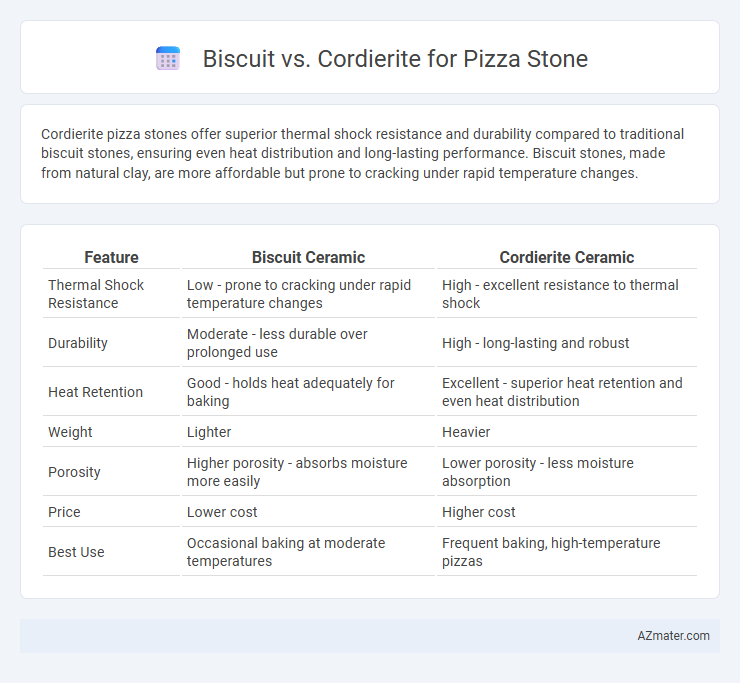Cordierite pizza stones offer superior thermal shock resistance and durability compared to traditional biscuit stones, ensuring even heat distribution and long-lasting performance. Biscuit stones, made from natural clay, are more affordable but prone to cracking under rapid temperature changes.
Table of Comparison
| Feature | Biscuit Ceramic | Cordierite Ceramic |
|---|---|---|
| Thermal Shock Resistance | Low - prone to cracking under rapid temperature changes | High - excellent resistance to thermal shock |
| Durability | Moderate - less durable over prolonged use | High - long-lasting and robust |
| Heat Retention | Good - holds heat adequately for baking | Excellent - superior heat retention and even heat distribution |
| Weight | Lighter | Heavier |
| Porosity | Higher porosity - absorbs moisture more easily | Lower porosity - less moisture absorption |
| Price | Lower cost | Higher cost |
| Best Use | Occasional baking at moderate temperatures | Frequent baking, high-temperature pizzas |
Introduction: Biscuit vs Cordierite Pizza Stones
Biscuit and cordierite pizza stones differ primarily in their thermal properties and durability. Biscuit stones, made from dense ceramic materials, heat evenly and retain heat well but are more prone to cracking under extreme temperature changes. Cordierite stones, composed of a mineral known for high thermal shock resistance, offer superior durability and are preferred for frequent use in high-temperature baking environments.
What Is a Biscuit Pizza Stone?
A Biscuit pizza stone is a type of baking stone made from natural clay material known for its excellent heat retention and even heat distribution, ideal for baking crispy pizza crusts. Unlike Cordierite stones that are composed of a crystalline mineral with high thermal shock resistance, Biscuit stones tend to absorb moisture to create a slightly crispier bottom while maintaining a tender interior. Home bakers often prefer Biscuit pizza stones for their artisanal, restaurant-quality results, as they provide consistent baking performance and easy handling.
What Is a Cordierite Pizza Stone?
A cordierite pizza stone is a durable baking surface made from a mineral known for its exceptional heat retention and thermal shock resistance, making it ideal for high-temperature pizza ovens. Unlike biscuit stones, cordierite stones evenly distribute heat, preventing cracks and ensuring a crisp, evenly cooked crust. Its ability to withstand rapid temperature changes without breaking makes cordierite a preferred choice for professional and home pizza baking.
Heat Retention and Distribution
Cordierite pizza stones offer superior heat retention and even heat distribution, making them ideal for achieving consistent pizza crusts by maintaining stable temperatures during baking. Biscuit stones, typically made from ceramic or clay, heat up faster but tend to lose heat quickly, resulting in less uniform cooking and potential hot spots. Cordierite's ability to withstand thermal shock and retain heat longer ensures optimal baking performance compared to biscuit materials.
Durability and Lifespan Comparison
Cordierite pizza stones offer superior durability and thermal shock resistance compared to biscuit stones, making them ideal for repeated high-temperature use without cracking. Biscuit stones, often made from porous clay, tend to absorb moisture and are more prone to chipping and breaking over time. Cordierite's lifespan significantly exceeds that of biscuit stones, maintaining structural integrity and heat retention through thousands of baking cycles.
Thermal Shock Resistance
Cordierite pizza stones exhibit superior thermal shock resistance compared to biscuit stones, making them ideal for rapid temperature changes without cracking. Cordierite's unique crystal structure allows it to withstand repeated heating and cooling cycles, ensuring durability and consistent cooking performance. Biscuit stones tend to be more prone to thermal stress fractures, reducing their lifespan in high-temperature pizza baking environments.
Cooking Performance and Pizza Crust Results
Cordierite pizza stones offer superior heat retention and even heat distribution compared to biscuit stones, resulting in consistently crispy and evenly cooked pizza crusts. Biscuit stones, while more affordable, tend to heat less uniformly, which can lead to unevenly baked crusts with occasional hot spots or soggy areas. Cordierite's thermal shock resistance also ensures reliable performance over time, maintaining optimal cooking conditions for perfect pizza crust texture and flavor.
Maintenance and Cleaning Requirements
Biscuit pizza stones, made from dense ceramic material, require gentle cleaning with a soft brush or cloth to avoid cracking, and should never be soaked in water to prevent moisture absorption that leads to damage. Cordierite stones are more durable and resistant to thermal shock, allowing for easier maintenance with simple scrubbing and occasional baking to burn off residues, making them less prone to cracking and absorbing odors. Both materials benefit from avoiding soap and using dry cleaning methods to maintain their cooking surfaces and longevity.
Price and Availability
Biscuit pizza stones are typically more affordable and widely available in general kitchenware stores and online marketplaces, making them a budget-friendly option for home cooks. Cordierite pizza stones, valued for their superior heat retention and durability, tend to be pricier and are often found in specialty cooking or baking supply stores. Price variations for cordierite stones reflect their enhanced performance, while biscuit stones remain accessible for those prioritizing cost-efficiency and ease of purchase.
Which Pizza Stone Is Best for You?
Biscuit pizza stones, made from ceramic or porcelain, offer excellent heat retention and even cooking, making them ideal for home use and lighter pizzas. Cordierite pizza stones withstand higher temperatures and thermal shock better, providing durability and consistent performance for frequent or high-temperature pizza baking. Choosing between biscuit and cordierite depends on your cooking frequency, preferred pizza type, and oven temperature capabilities.

Infographic: Biscuit vs Cordierite for Pizza Stone
 azmater.com
azmater.com